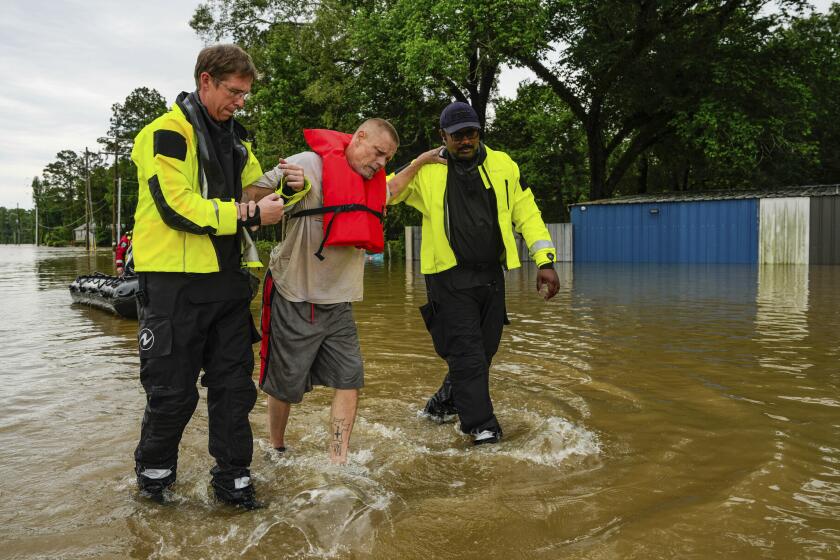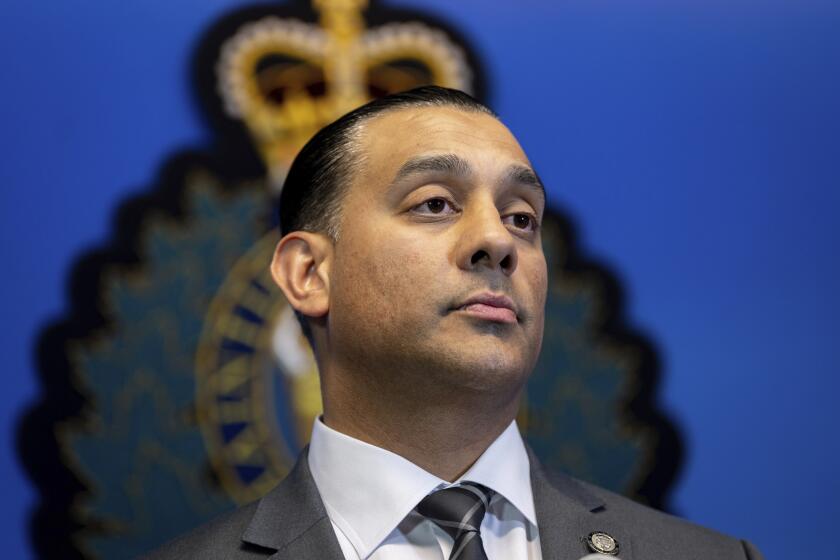S. Korean Opposition Figure Bars ‘Politics of Revenge’
Kim Young Sam, adviser to the opposition New Korea Democratic Party, said Tuesday that if the opposition takes power in 1988, it will have to be careful to avoid falling victim to another military coup.
At the same time, Kim expressed optimism that South Korea has now embarked on a path that will lead to democratic reforms.
He said in an interview that if his party, the principal opposition party, assumes power in 1988, it will promise not to engage in “the politics of revenge.”
“I sense on the part of the public a desire for some kind of retribution against those who have discriminated against and exploited us,” he said. “But I think we have to be generous enough to cross this chapter of history. Otherwise, our party and government may not last longer than half a year, even if we have a chance to take power.”
Asked if he was referring to the possibility of a military coup, he said yes.
One of 2 Contenders
Kim, 57, the last leader of the opposition under President Park Chung Hee, who was assassinated in 1979, was prevented from taking part in political activity from 1980 to 1985 by Park’s successor, President Chun Doo Hwan. Kim is regarded as one of the two men likely to be the New Korea Democratic Party’s standard-bearer in an election to replace Chun. The other is Kim Dae Jung, 62, the opposition’s candidate in the last free presidential election South Korea had, in 1971.
Despite his wariness, Kim said he believes that South Korea’s military, the Chun government’s principal source of support, is prepared to allow a civilian-led government to assume power in 1988, when Chun is constitutionally required to step down.
Asked if he thinks South Korea’s military will stand aside to let the ruling and opposition parties work out democratic reforms between now and 1988, Kim replied:
“There is no question that the military constitute a very important class in the dynamics of politics of South Korea. But they appear to be aware of the fact that there is a limit to military involvement in politics. I see a growing consensus on their part that should allow, by 1988, a traditional civilian government.”
The one point on which Kim did express concern about the military’s reaction between now and 1988 is the opposition’s demand for amnesty for Kim Dae Jung, who is free under a suspended 20-year sentence for sedition.
Kim Young Sam said he realizes that “there is a tremendous resistance on the part of the party in power and the military toward Kim Dae Jung.” But he said the ruling party agreed with the opposition on May 29 to “guarantee the people a free choice of government,” and agreed that “no one should be excluded from becoming a candidate.”
“It must be done,” he said, referring to amnesty for Kim Dae Jung. “There is no alternative.”
Kim said the New Korea Democratic Party will renew its mass rallies demanding reform if the current special session of the National Assembly closes without setting up a committee to revise the constitution that was imposed under martial law in 1980.
But he said he is optimistic that the committee will be established, though probably not until the last day or two of the session, which is scheduled to end June 24.
Political Prisoners
“Our precondition is to make an all-out effort to release as many political prisoners as possible,” he said. “Both (the prisoners and the committee) are important targets. But sometimes you cannot achieve both at the same time. All these issues may gather into a storm on or around June 23 or 24. Those may be the decisive dates.”
Kim expressed optimism that once the debate on the constitution begins, the outlook is good for genuine reform. Revisions could be completed by the end of September, he said, and a referendum to approve them could be held by the end of the year. Then, he said, the parties would call conventions early next year to choose candidates.
Kim said that an election for a leader to succeed Chun “would be ideal in the fall of 1987; the winter is too cold.”
Democratic reform is inevitable, Kim said, because the ruling Democratic Justice Party, which has committed itself to amending the constitution, needs the opposition’s agreement. Two-thirds of the National Assembly must approve amendments for submission to a national referendum, and the ruling party controls less than two-thirds of the membership.
Kim said the only point on which the New Korea Democratic Party will not compromise is its demand for a direct presidential election to choose Chun’s successor. But he said he believes that Chun’s party is flexible on this demand.
“If the other side agrees to the direct presidential election system, everything else will be a blank piece of paper on which we can negotiate . . . and make concessions,” he said.
Kim said his party insists on a direct presidential election because a majority of the South Korean people want it.
“Therefore, irrespective of academic merits, I think we should adhere to the public demand . . . although I do think that both a direct presidential election system and a parliamentary cabinet system are different forms of democracy,” Kim said.
More to Read
Start your day right
Sign up for Essential California for news, features and recommendations from the L.A. Times and beyond in your inbox six days a week.
You may occasionally receive promotional content from the Los Angeles Times.






